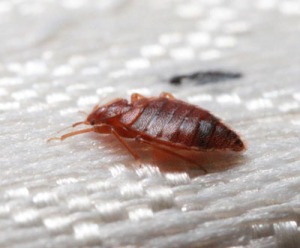
Even the best over-the-counter insecticides are most effective when spraying bed bugs directly. Insecticides are no substitute for a good integrated control program.
Bed bugs are best treated by an experienced professional. Let me say that again… If you have bed bugs, and you can hire a professional who knows what they’re doing, then do it. It can save you much grief and lost sleep. Now that I’ve said that, let me address those who, for whatever reason, must fight bed bugs without professional help.
If professional service is not in the cards for you right now, you have some options. First consider the approach outlined in my fact sheet on do-it-yourself bed bug control. Much of this approach is based on non-chemical tactics; however, to completely eliminate bed bugs you will usually need to use at least some form of insecticide.
Fortunately, a new study by Narinderpal Singh and others from Rutgers University has identified two low-toxicity products that are surprisingly effective against both bed bugs and their eggs. EcoRaider™ and Bed Bug Patrol™ are essential oil-based insecticides available over the counter and via the Internet. Both of these products were the most effective of 11 plant oil- or detergent-based insecticides tested. When sprayed directly on bed bugs in two trials, these products were the only ones that provided greater than 90% control of bed bug nymphs. EcoRaider™ caused 100 percent mortality after 10 days in two trials. Bed Bug Patrol™ caused 91-92 percent mortality after 10 days in two trials. Though these essential oil products were slower than the professional insecticide Temprid® SC, they provided equal control after 10 days.
The toughest life stage of bed bugs to kill is the egg stage. In direct spray tests only EcoRaider™ caused high mortality (86%). All other products, including the professional standards, provided less than 17% control.
Ideally with an insecticide you want a product that will not only kill on direct contact, but one that will leave a residue that continues to kill insects, and not repel them, after it dries. Singh and colleagues tested their two top plant oil-based insecticides against two professional products, Temprid® SC and Demand® CS. Bugs were confined on one-day old residues on cotton fabric for five minutes and then put in a clean dish and watched for mortality. After ten days, 93% of bugs exposed to EcoRaider™ and Bed Bug Patrol™ residues died. This was impressive, even though the residues were only one day old. Even more surprising was that these products were equivalent to Temprid® SC, and were significantly better than Demand® CS after even only one day of spraying. However when bed bugs were allowed to choose between resting on treated or untreated surfaces, the two professional products were significantly better. This suggests that bed bugs might avoid surfaces treated with the plant oil based products when given a choice.
If you are reading this and thinking you’ve now found the solution to bed bugs at your home, think again. The authors of the study emphasize that all spray exposures were done under ideal conditions. It is likely that results in the field, where bed bugs are usually protected in cracks and crevices of furniture and bedding, will not be as good. Also, professional products like Temprid® SC and others are designed to continue to kill for more than one day after spraying. Our plant-based residues in this test were not aged more than one day, and given the volatility of plant oils I would not expect them to last very long.
That said, if you are looking for an insecticide to kill bed bugs on contact, I would carefully look at one of these two, based on this research. I would not waste my time on rubbing alcohol (flammable) or bleach or other common home remedies. Other insecticides evaluated in this study included “Bed Bug 911, Eradicator, Bed Bug Bully, Bed Bug Fix, Ecoexempt IC2, Essentria, Rest Assured, Green Rest Easy, and Stop Bugging Me”.
Not addressed in the Rutgers’ study are the dessicant dusts, like diatomaceous earth and silica aerogels. Dessicants will also kill bed bugs when properly applied, and are good low-cost, low-risk treatment options. But more about those in another posting.
Remember that DIY insecticides alone are not likely to rid your home of bed bugs, especially products that do not keep killing after they dry. If you cannot afford, or can’t find, an experienced professional, read through the recommendations in my fact sheet. Please note that mentions of trade names in this article does not imply endorsement of a products, but are included for educational purposes only.